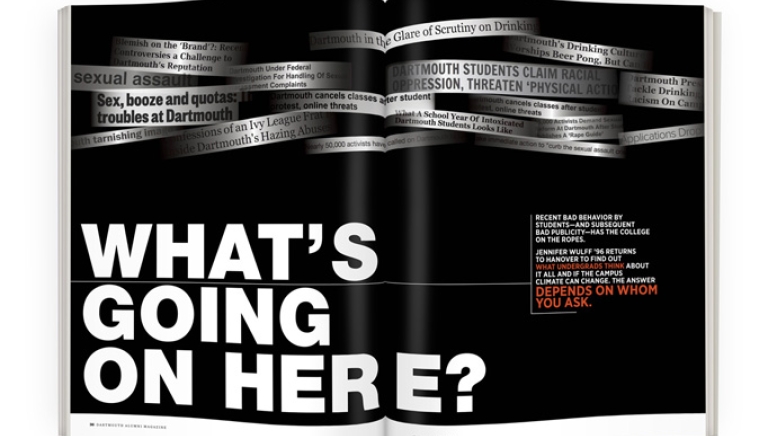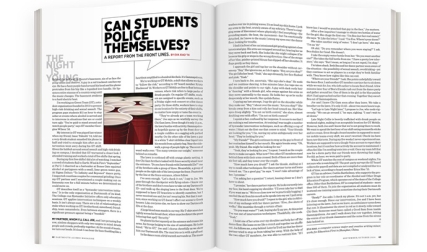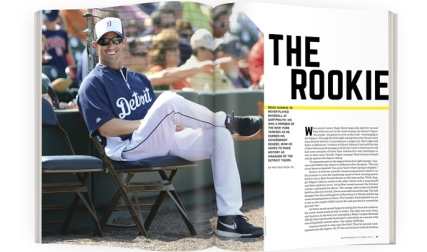Does mung stain? I wonder as I remove my splattered pants and boots and seal them in a plastic bag. I’ve just returned to my room at the Hanover Inn after my first night of playing pong in the Alpha Delta basement. Me, a 42-year-old wife and mom, finally learning to lob all these years later. I’m in town for Green Key Weekend, not technically here to party, but when I’m invited by some of the more rowdy members of the Alumni Council, who are here for a meeting, I tag along.
As I watch a few of the boys play I’m mildly disgusted as they chug cups of beer that a ball covered in gray floor matter just landed in. (Especially when another guy is peeing against the wall just a few feet away.) But instead of having a sit-down with them about the limitations of the five-second rule, I take a place at the table myself and, paddle in hand, ask about the recent issues plaguing Dartmouth.
Whether it’s The Huffington Post, The Wall Street Journal, Fox News, The New York Times or even Cosmopolitan, there’s been no shortage of bad press about Dartmouth lately, covering and commenting on everything from binge drinking to cyberbullying to the Dimensions and last April’s “freedom budget” protests. Furthermore the rape trial last spring of Parker Gilbert ’16—which led to an acquittal—cast a glaring spotlight on the issue of campus sexual assault. Previously, in May 2013, 30 students and alumni filed a Clery Act complaint against the school. The same month it was announced that the U.S. Department of Education Office of Civil Rights had opened a Title IX compliance investigation. “It’s been a little tense here,” one student I speak with says. “You just feel like everyone’s hating on Dartmouth.”
There’s no doubt the College has been nailed in the press before. (An Esquire story from 1979 doesn’t read much differently than the 2012 Rolling Stone piece that detailed fraternity hazing practices recounted to writer Janet Reitman by Andrew Lohse ’12.) But with a 14-percent decrease in applicants for the class of 2018, it seems the College may have a bigger problem on its hands than just some bad PR. Is my idyllic College on the Hill in a serious downward spiral? Sure, we hear about committees forming and initiatives being adopted and a sense of genuine concern from Parkhurst. But what do the students think about how to resolve the school’s issues?
According to the AD contingent, at least in this moment of downing cups of Keystone Light and enduring party-crashing old-schoolers, the negative news stories are just a matter of undeserved piling on. Dartmouth was, is and will always be the best college ever. “We just get picked on by the media,” one brother says. “The issues we have here are at every other school.”
For other students that’s not a good enough answer.
“Dartmouth has a problem!” chanted one group last year, crashing the Dimensions weekend welcome show in an attempt to warn accepted-but-not-yet-enrolled applicants about racism, homophobia and sexism on campus. Although the “Real Talk” protesters numbered only 15 or so, their actions made national news. On April 1 another group, this time 35 students, took its grievances straight to the office of President Phil Hanlon ’77. Confronting him in the middle of a Tuesday afternoon, the students demanded he go over in detail a 73-item list of changes they want to see on campus, including an increase in the number of minority students and faculty members, stricter punishments for sexual assault offenders and an evaluation of the Greek system.
“There’s this sense that we as students of color have been given so much, we should just take it and be happy,” says Aby Macias ’14, a student from Sparks, Nevada, and a member of Casque & Gauntlet. “But that doesn’t mean I’m not going to critique Dartmouth for what it’s lacking.” As for the Moving Dartmouth Forward steering committee, which Hanlon formed “to recommend actions to end high-risk and harmful behavior in the following three critical areas: sexual assault, high-risk drinking, and lack of inclusivity,” Macias is wary. “I can’t imagine that another committee is actually going to get something done,” she says. Although the traditional student—the wealthy, white, straight male—may find little to complain about, “a lot of students don’t know that their peers are having a vastly different ‘Dartmouth experience,’ ” says Dondei Dean ’17, another participant in the freedom budget sit-in.
Hanlon, who allowed the freedom budgeters to spend two days and nights in his office before then-Dean of the College Charlotte Johnson got the group to agree to a series of future meetings, is fed up with a few things himself: “Dartmouth’s promise is being hijacked by extreme behavior, masked by its perpetrators as acceptable fun,” he said when announcing the formation of his steering committee, which will present recommendations to Hanlon and the board of trustees in September.
To get a sense of student opinion on campus concerns before I headed up to Hanover, I created a Bored at Baker account. B@B, as it’s dubbed, is an online forum that isn’t run by the College but does require a dartmouth.edu email address to join. Once you’re in, you can comment anonymously, which leads to musings ranging from the mundane to the scatological to the downright offensive. With trolls making comments such as “Hitler did nothing wrong,” you don’t go to the site for warm fuzzies.
Last January one student listed step-by-step instructions on how to assault another student. The post included her name as well as her dorm. The “rape guide,” as it became known, rattled the campus, leading some to suggest that B@B should be banned. Others see the merits of an anonymous chat space. “It serves a purpose. People want a place where they can just say what they feel,” says Sandor Farkas ’17, an ROTC cadet, member of the Hillel board and a Dartmouth Review staffer. “They don’t want some incredibly moderated official dialogue.”
I post a request for students to write to me if they’d like to weigh in on some of the recent campus issues that have been in the news, and I’m electronically frisked: “Credentials needed. Are you a freelancer with HuffPost? Are you with a serious large city newspaper? Are you with Rolling Stone? I doubt you’re with the ‘paper of record’ for the U.S. if you’re soliciting here,” wrote one. Ouch. I get pushback from a lot of students I approach in person, too, even after I do give my credentials. Some worry about bias, others, Google. “When you’re on a job search you worry about your name coming up in an article,” one senior tells me. “Even if what you say is positive, you don’t want to put any quotes out there that can be taken the wrong way.”
The students I do speak with have different points of view on how serious Dartmouth’s current challenges are and how to face them, but they all seem to agree that talking with one another would be a great start. Few seem to know how. “We need to learn how to fight better,” says Prodhi Manisha ’17, who is from Hong Kong. “If we’re concerned about actually making the community more inclusive, we need to start small.” For her, one victory was gently confronting a friend who thought it was okay to make fun of foreign accents because people imitated his New England one. “It’s easy to blame a person for being a certain way,” she adds. “But we need to realize that we all come from different backgrounds and points of view. Someone may not realize how to speak about race issues off the bat.”
While a singer with a band outside Collis belts out the Bob Marley refrain, “Every little thing gonna be all right,” I talk to Manisha and Connie Gong ’15, who grew up in Boston and is the president of the coed house Tabard. The hot topic of the moment—Phiesta—comes up as an example of students unable to resolve conflicts. Phiesta was a burritos-and-virgin-cocktail fundraiser (part of an annual national effort) planned for early May by Alpha Phi and Phi Delta Alpha that was abruptly canceled after a student raised questions about racial insensitivity and cultural exploitation of Cinco de Mayo. It was only a small faction that opposed the benefit for cardiac care, but the organizers called it off.
“I don’t think you could say the party was racist in any way, shape or form,” says Gong. “But when this is the same school where a Bloods and Crips party was hosted and nobody said anything…you get it.” (Last summer AD and Tri-Delt held a party where guests dressed as gang members.) In an effort to see if both sides could hear each other out on the heated topic of Phiesta, Tabard held a meeting for the party planners and Latino students. It did not, Gong says, go well. “On the one side it was like, ‘You white f***ers, how dare you hold this racist party?’ and on the other side it was, ‘You’re not [explaining why you’re upset], you’re not being constructive!’ So there was all this yelling instead of a real conversation with real points of view.”
Dean, who is black, recalls trying to have a dorm meeting on diversity: “A white floor-mate refused to participate, under the excuse that ‘politics and the economy are what’s important,’ instead of diversity issues,” she says. “It made me painfully aware that so many students choose not to care about the comfort of minorities.”
While some, such as Dean, have struggled to feel welcome, others are frustrated by students’ reluctance to talk to those with opposing views. “My biggest gripe about campus climate is that people don’t want to discuss the actual issues that they’re bringing up,” says Farkas, who adds that dialogue flowed much more freely at his all-male military academy. “They don’t want anyone to challenge them, so their solution is a resistance to this institution. We used to have actual racist conservatives here, but you cannot say that this is a white male imperialistic hierarchy now. Look outside—there are people from all over the world here, from all different backgrounds.”
I recall being fired up about a few issues myself when I was a student. There’s my op-ed in The D archives where I defended the right of free speech after a Beta brother outraged the community with a sexist and racist poem. Not sure I’d take that stance today. I also marched in a protest against Playboy’s “Women of the Ivy League” issue, carrying a sign that read something like “Don’t Objectify Us!” I wouldn’t do that again, either. But finding a cause to stand up for, even if you might change your position later, should be part of every college experience. It heartens me to see students care so much about Dartmouth’s future—and each other. How passionate they are, even if misguided at times. As for their hope of talking things out and coming to some agreement on how to resolve the College’s challenges, I want to tell them it’s probably never going to happen, but it’s still good that they’re trying.
One student who seems to have it all in perspective is Noah Bond ’13. The son of single mom Rachel Bond ’91, who gave birth her senior year, he calls Hanover his first home. He was even strapped to mom’s back when she walked onstage to get her diploma. But when he returned as a student, he worried he’d made a mistake. “It’s hard to find your place here if you’re an outlier or considered any different from the mainstream community,” says Bond, whose father is Kenyan and whose mother is Native American and Jewish. (“Yeah, I’m pretty diverse,” he laughs.) “I questioned whether Dartmouth was right for me.” He took two and a half years off, working and traveling in the United States and overseas, and came back “determined to make it work,” he says. “I guess if I learned anything from the ‘real world’ it’s that there are faults in any community. But right now we’re starting to identify our problems here and that’s amazing. That’s a good sign. I think President Hanlon has his heart in the right place and wants to make things better for everyone.”
It’s Friday night. After perusing a special 24-page section on sexual assault in The Dartmouth, I head over to Gold Coast lawn for a concert. I’ve made my best effort to fit in by wearing a pair of faded jeans, a slouchy sweater and sneakers. I should have borrowed a dress from my 6-year-old instead. Along with other noticeable changes on campus, such as dining services’ all-caps warnings that the fruit is unwashed and the demolition of the eyesore that was the “Shower Tower,” the girls’ attire is far different from what it was in the mid-1990s. I’m one of only a few not wearing a teensy dress or small romper-type getup. No one is paying much attention to this over-aged nerd wading through the crowd anyway. All eyes are on the stage, where hip-hop star Lupe Fiasco is performing. I look around at the young fans of every background pumping their fists and shouting along to the lyrics, and I’m touched by this display of unity. With a multitude of F-bombs emitting from the speakers and a few students grinding just a little too hard, the scene doesn’t quite mirror an Enchantment Under the Sea-type dance. But the kids are all bouncing and happy. Any campus tension seems replaced by a sheer love of the music.
Even Lupe, perhaps also moved by the scene, pauses between songs to remind the crowd to make good use of their time at Dartmouth. “You all got an important duty ahead of you: You’ve got to make this world a better place. Don’t take your education for granted….Go out there in the world and be constructive, positive people.” Cheers and applause, then a song about being a superstar. It all seems so simple.
Is this the answer to mending the rift in this community—hiring a 12-time Grammy nominee every weekend so the students can socialize outside their usual circles and find common ground? The reality is that frats still dominate the social scene. Steps are being made to offer alternatives, such as the new Hop Garage Bar, where students can party in a less, er, urine-soaked atmosphere (and with better beer), but it’s only open on Thursdays and, of course, you only get the free booze if you’re of age.
Ever since the College went coed in the 1970s there have been those who have wanted to do away with the Greek system altogether. It’s still an issue students bring up and feel passionately about one way or the other. Make no mistake, it’s possible that the steering committee will suggest to Hanlon, who was an AD, and the board that the system needs to go or be seriously reformed. “I will say that we are looking at the Greek system with the eye to making changes on campus in the same way we’re looking at making changes in residential life,” says steering committee chair and English professor Barbara Will. “President Hanlon has said he wants fundamental change in every social space on campus, so I don’t think you can ignore it.” Alums from decades ago may choose to think the College social scene hasn’t changed much from their days, but, as Will says, “We’re at a different moment, nationally as well as on campus. There’s a lot less tolerance for behavior that passes as fun. People are getting hurt.”
Many students I spoke with think ridding Dartmouth of frats won’t do much of anything. “Abolishing the Greek system is an oversimplification,” says Lexi Krupp ’15, who adds that she’s “not afraid walking around campus at all.” And those affiliated are tired of taking the blame for all the problems at Dartmouth—especially the issue of sexual assault. “All the guys I associate with here are such good people, really good people, and I cannot imagine them doing anything depicted in these articles,” says Theta Delta Chi brother Robbie Rodriguez ’14, a football recruit from California. “In reality there are a good amount of dudes out there looking out for these girls and making sure they’re all right.”
With programs in place such as the Bystander Initiative and the Green Team [see story next page], which pays students to stay sober and keep an eye out for any trouble at parties, as well as a new, more stringent policy on punishing offenders, Dartmouth is utilizing sexual assault prevention techniques recommended by experts and proven successful elsewhere. For some students, it’s the bigger picture they’re worried about. “The administration and the student body need to understand sexual assault as a systematic execution of violence used to keep people in line,” says one of the Clery Act complainants, Anna Winham ’14, who was sexually assaulted her sophomore year and who demonstrated in the freedom budget protests. “It’s fundamentally about power and who gets to exercise it, not about a few bad apples and educating bystanders.”
Saturday is one of those perfect Hanover days. Sunny and breezy and beautiful. In the afternoon I’m at the Dartmouth Bookstore meeting with Jake Gaba ’16, who has just arrived from a day at the organic farm and a practice with his a cappella group, the Sing Dynasty. Gaba is somewhat of a campus celebrity after he and pals Yesuto Shaw ’15 and Jeremy Thibodeau ’14 put together a video of students mugging and dancing to Pharrell Williams’ catchy tune “Happy.” (Other schools have also made versions.) “I just wanted everyone to feel better,” he says. “Someone said to me, ‘You’re only here four years and life’s too short not to fall in love with Dartmouth.’ I’ve taken that to heart.”
At last count the video had 84,000 views on YouTube—and for good reason. It highlights not only the beauty of the campus, from the stately halls of Baker to the new Black Family Visual Arts Center, but, more importantly, Dartmouth’s inimitable spirit. Starring students from the far left to far right and everything in between—even Keggy makes an appearance—they dance and clap and make this alum very proud. While an uplifting video can’t mend the bigger problems on campus, it’s a reminder to all of us—students, faculty, administrators and alumni—that we need to do everything we can to try.
“I’m so hopeful for the future of this school,” says Bond, who is happy in Hanover these days. “Ultimately what’s going to define Dartmouth won’t be based on the problems we currently have, but our ability to look critically at those problems and make sure they’re not here 10 or 20 years from now. We need to ask ourselves, ‘How can we make this the best place to be? How can we be awesome?’ Because Dartmouth really can be awesome.”
Jennifer Wulff is a former writer for People magazine and a frequent contributor to DAM. She lives in Wilton, Connecticut.




